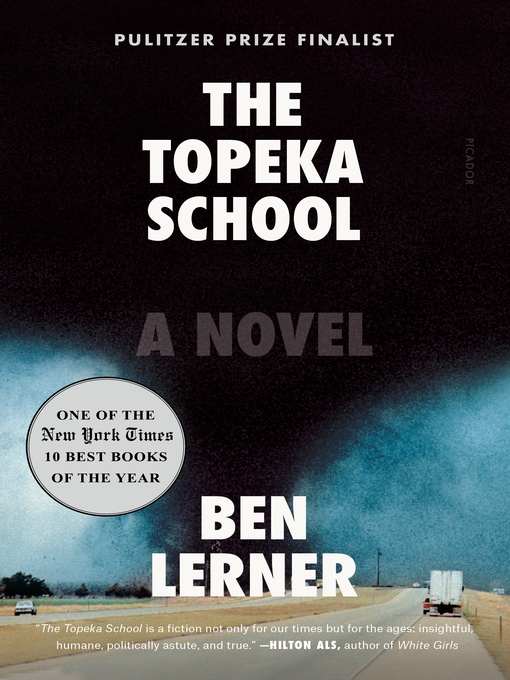Review by Booklist Review
The messy relationship between masculinity and language drives this seeking, eloquent story by poet-novelist Lerner (10:04, 2014; Leaving Atocha Station, 2011). Adam Gordon (maybe the same Adam Gordon as in Leaving Atocha Station, maybe not) is a debate-team prodigy. The son of talk-therapy professionals, Adam loves poetry and believes in the power of words. At parties, after a few drinks, freestyle rap keeps him out of fights, unlike his damaged classmate Darren, whose violent impulses are neither sublimated into nor constrained by mere words. Seeking early stirrings of today's sociopolitical tensions in 1990s Kansas, Lerner interrogates Adam's personal origins, dependency upon language, and the complicity tacit in his adolescent oblivion. Chapters narrated by Adam's psychologist parents reveal other masculine transgressions and suggest that Adam's issues are not his alone. The ekphrastic style and autofictional tendencies echo Lerner's earlier works, and his focus on language games and their discontents fits nicely within the 1990s setting. But the fear at the core of this tale that language, no matter how thoroughly mastered or artfully presented, simply isn't enough feels new and urgent.--Brendan Driscoll Copyright 2010 Booklist
From Booklist, Copyright (c) American Library Association. Used with permission.
Review by Publisher's Weekly Review
Lerner made a huge impact on contemporary fiction with his two previous drawn-from-life novels, Leaving the Atocha Station and 10:04. With his latest, he leaves behind his typically erudite first-person protagonists in favor of a Kansas boyhood in the 1990s. For the time being, high school senior Adam Gordon can only dream of "a vaguely imagined East Coast city where his experiences in Topeka could be recounted only with great irony." But he is a brilliant member of the debate club and the son of two psychotherapists, Jonathan and Jane, who are tied to the Foundation, an experimental treatment facility where Adam is himself a patient of the eccentric (and possibly psychic) Dr. Kenneth Erwood. Readers delve deeper in the Foundation in evocative chapters narrated by Adam's parents, who tell the story of their courtship, Jonathan's extramarital affair with Jane's best friend Sima, and adventures in academia. Also haunting the novel is the figure of Darren, a teenage outsider whose inclusion in Adam's clique ends in a disastrous act of violence. Lerner's greatest strength lies in interstitial period details in the zeitgeist: Bob Dole, Reverend Fred Phelps, and Tupac Shakur. Loosely plotted but riveting, this novel expertly locates the thread of the anxious present in the memory-stippled past. (Oct.)
(c) Copyright PWxyz, LLC. All rights reserved
Review by Library Journal Review
Straddling a fine line between fiction and memoir, this book reintroduces Adam Gordon, the narrator of Lerner's acclaimed debut novel, Leaving the Atocha Station. Adam's youth in Topeka, KS, is unveiled in alternating chapters told by his parents, Jonathan and Jane, practicing psychologists who reveal more about their own emotional lives than their son's. We do learn that Adam is a top-notch debater who excels at the art of employing words to obfuscate more often than to explicate, perhaps a perfect metaphor for a novel set on the campus of The Foundation, an institution dedicated to the efficacy of talk therapy. And these characters do talk, seeking explanations for traumas large and small. Parental abuse, infidelity, rampant sexism, and the complexity of aging and memory are all subject to Lerner's scrutiny. Threaded throughout the Gordon family's story is the ominous tale of Adam's schoolmate and Jonathan's patient, Darren Eberheart, whose precarious hold on reality might by shattered by the bullying of his peers. VERDICT Readers seeking the wry humor for which MacArthur fellow Lerner is noted will find it in short supply here. This exploration of the angst-filled road to manhood is recommended for fans of Jonathan Franzen. [See Prepub Alert, 3/25/19.]--Sally Bissell, formerly with Lee Cty. Lib. Syst., Fort Myers, FL
(c) Copyright Library Journals LLC, a wholly owned subsidiary of Media Source, Inc. No redistribution permitted.
Review by Kirkus Book Review
In which the author scrupulously investigates his upper-middle-class upbringing to confront its messy interior of violence, betrayal, and mental illness.Adam, the center and occasional narrator of Lerner's (The Hatred of Poetry, 2016, etc.) essayistic and engrossing novel, enjoyed a privileged adolescence in the Kansas capital during the 1990s: He competed nationally in debate, had plenty of friends, and was close to his parents, two psychologists at an illustrious foundation. (Lerner is again in autofiction mode; he, too, competed in high school debate, and his parents are psychologists who've worked at Topeka's Menninger Clinic.) But all is not well: Fred Phelps' homophobic Westboro Baptist Church recurs in the narrative, a childhood concussion has left Adam with migraines, and his parents' marriage is strained. Lerner alternates sections written from the perspectives of Adam, his mother, and his father with interludes about Darren, a mentally troubled teen who committed an act of violence at a party that Adam feels complicit in. How much? Hard to say, but the book sensitively gathers up the evidence of abuse, violation, and cruelty in Adam's life. Though the conflicts are often modest, like Adam's mom's fending off Phelps-ian trolls angry at her bestselling book, Lerner convincingly argues they're worth intense scrutiny. As a debate competitor, Adam had to confront a "spread"an opponent's laying out a fearsome number of arguments, each requiring rebuttalsand Lerner is doing much the same with his adolescence. How do childhood microaggressions build into a singular violent act? Were the rhetorical debates between the Phelpses and the foundation a rehearsal for contemporary Trumpian politics? Few writers are so deeply engaged as Lerner in how our interior selves are shaped by memory and consequence, and if he finds no clear conclusion to his explorations, it makes the "Darren Eberheart situation" increasingly powerful and heartbreaking as the story moves on.Autofiction at its smartest and most effective: self-interested, self-interrogating, but never self-involved. Copyright Kirkus Reviews, used with permission.
Copyright (c) Kirkus Reviews, used with permission.


